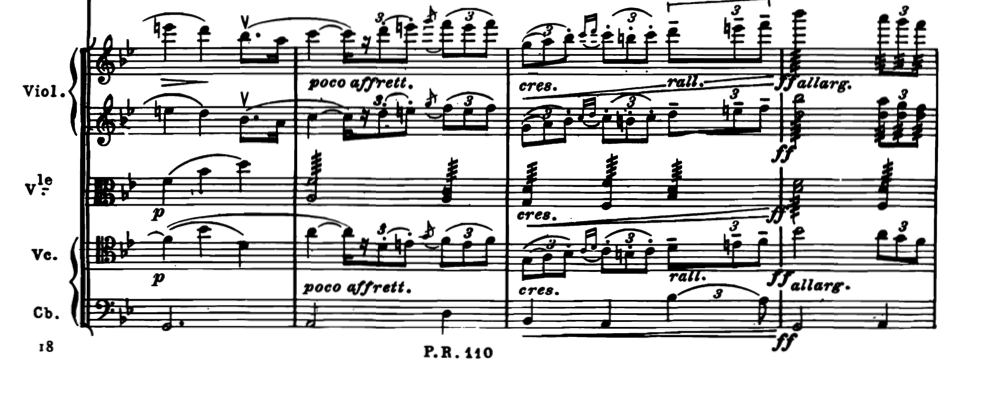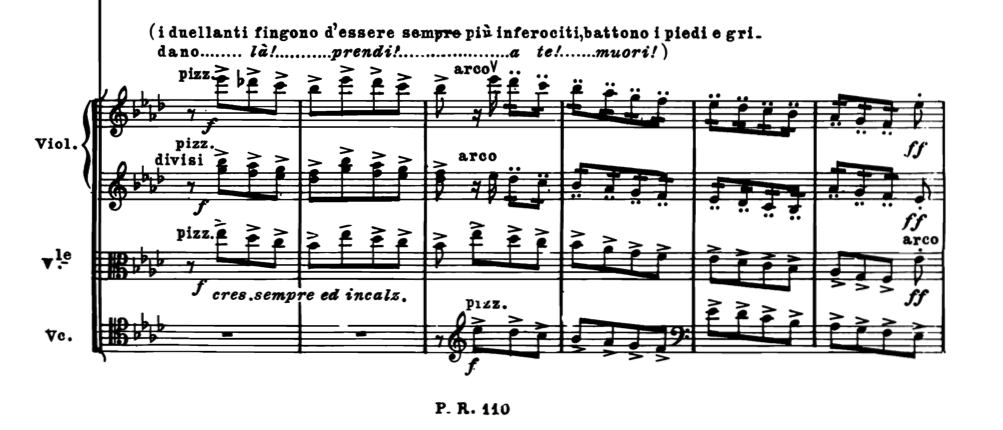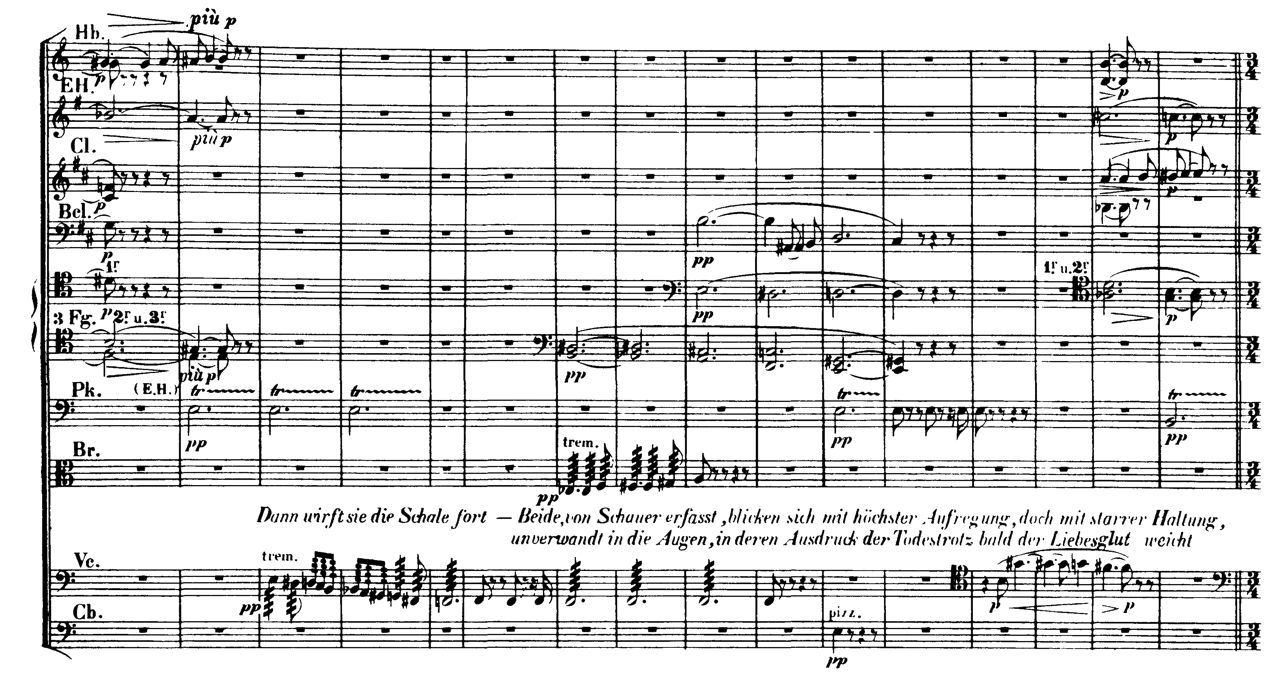Page 2 of 3
Re: Repeated tone abbreviation standards
Posted: 05 Mar 2016, 16:25
by John Ruggero
Here are the Boheme examples, which are interesting. In the first example, we see the newer convention:

- Boheme tremolos.jpeg (85.76 KiB) Viewed 9651 times
Yet later we see the older:

- Boheme Repeated notes.jpeg (81.19 KiB) Viewed 9651 times
So there is yet another complication. Is it possible that in earlier engraving, 16th-note or exactly repeating figures were placed in a separate category with their beams running parallel, while real tremolos always ran up to the right as in the new style?
Re: Repeated tone abbreviation standards
Posted: 05 Mar 2016, 17:44
by Knut
John Ruggero wrote:Is it possible that in earlier engraving, 16th-note or exactly repeating figures were placed in a separate category with their beams running parallel, while real tremolos always ran up to the left as in the new style?
As far as I know, you're spot on; the 'old' notation is only used for measured trmolos. Unmeasured tremolos use the independently angled marking, regardless of period.
I can't back it up with examples off hand, but my distinct impression is that the modern practice became standardized independently of computer based engraving. Kurt Stone's book
Music Notation in the Twentieth Century (1980) does not mention the parallel measured tremolo notation at all. The examples in his book is entirely hand engraved.
Also, although it's not a comprehensive text on music notation, Ted Ross' book on manual engraving standards does not acknowledge the 'old' notation for measured tremolos, either.
Re: Repeated tone abbreviation standards
Posted: 06 Mar 2016, 17:10
by John Ruggero
Knut:
the 'old' notation is only used for measured trmolos. Unmeasured tremolos use the independently angled marking, regardless of period.
Knut, I don't know if this is correct or not, as "right" as it seems to me from the practical, logical and aesthetic points of view.
Gould doesn't seem to make a distinction between measured repeated tones and unmeasured tremolos from the notational standpoint either. All of her examples on page 223 regarding beam angle seem to be unmeasured tremolos. If this is correct, Gould seems to be accepting unmeasured tremolos with the old beam-following style!
Continued research seems to be in order.
Re: Repeated tone abbreviation standards
Posted: 06 Mar 2016, 22:16
by MJCube
I see both styles coexisting in this passage of
Tristan und Isolde, in multiple editions. It would seem they were intended NOT to be unmeasured tremolos; in the first bar what would have been a

with one slash is written out as two 32nds. (Strangely, the

is beamed in Violas, but not in Violin I.) But I suppose they are usually played very fast and unmeasured anyway. I doubt the distinction was made in Wagner’s time.
Whether measured or not, the slash notation is consistent: angled unless there is a beam, and then parallel with the beam. Also, on beamed notes they are slightly shorter than the angled ones, which I suppose is good. (They are much bigger in those old scores of the
Ring, but those have so many staves on a page, even the dynamic marks are huge compared with most scores.)
Re: Repeated tone abbreviation standards
Posted: 06 Mar 2016, 23:15
by John Ruggero
Another Wagner example: Tristan Act I, when they drink the love potion. The marked tremolos follow the 1/8 beams in the cellos.

- Wagner.jpg (234.83 KiB) Viewed 9620 times
The notation throughout the Tristan first edition and my Breitkopf mini-score seems to be in the standard "old style": all unbeamed notes have the invariable slashes leaning upward to the right. All beamed notes have the slash following the beam direction, for both unmeasured or measured repetition.
The Boheme example seems to be in different old style, one that has the advantage of clearly distinguishing beamed unmeasured from beamed measured tremolos.
Re: Repeated tone abbreviation standards
Posted: 07 Mar 2016, 07:02
by OCTO
(The only problem I see with Finale is that the beaming angle makes it difficult to create different custom tremolos. I mean, you can create, but there will be to many. I am not sure if a plug-in would be able to solve it.)
Re: Repeated tone abbreviation standards
Posted: 07 Mar 2016, 10:51
by erelievonen
OCTO wrote:(The only problem I see with Finale is that the beaming angle makes it difficult to create different custom tremolos. I mean, you can create, but there will be to many. I am not sure if a plug-in would be able to solve it.)
Even if you did create many of them, you might still need different ones in the score and in the parts!
Re: Repeated tone abbreviation standards
Posted: 07 Mar 2016, 11:08
by Knut
Thanks to MJCube and John for the educational examples, which obviously proved me wrong.
John's Wagner example reveals something interesting to me: In isolation, one practical upside to applying these parallel tremolos to beamed notes, especially for unmeasured tremolos, is that they take up less vertical space, requiring less extension to the stems and leaving more room between the marking and the notehead. Together with 'new' style tremolos, this presents a problem, however, in that the stems do not reflect the interval relationships between beamed and unbiased notes. This might be one reason why these parallel style tremolos have been abolished.
Re: Repeated tone abbreviation standards
Posted: 07 Mar 2016, 11:15
by Knut
OCTO wrote:(The only problem I see with Finale is that the beaming angle makes it difficult to create different custom tremolos. I mean, you can create, but there will be to many. I am not sure if a plug-in would be able to solve it.)
I've tried this approach in the past, and I can tell you, it doesn't work in practice. There are just too many variables.
The only way I know of to do this in finale is a complicated process involving superimposing layers and Special Tools. It's doable in some situations, but certainly not very practical. Peter Thomson posted an example file in the same thread on the MM forum that John referenced in his opening post.
Re: Repeated tone abbreviation standards
Posted: 07 Mar 2016, 14:29
by John Ruggero
And even Peter Thomsen's very clever approach does not quite do the trick because the slashes produced are too long and have to be adjusted with a Special Tool, or the Broken Beam length has to be changed globally, which is makes this impractical in most cases. Perhaps there is a different way?